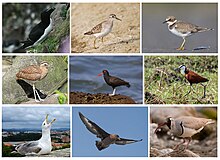Charadriiformes
Charadriiformes adalah ordo burung yang beragam dari ukuran kecil sampai sedang-besar. Itu mencakup 350 spesies dan memiliki anggota di seluruh dunia. Kebanyakan Charadriiformes adalah hewan kosmopolitan yang banyak tinggal dekat dengan air[1] dan memakan invertebrata atau hewan kecil; meskipun demikian, beberapa spesies adalah pelagik (burung laut), beberapa mendiami kawasan gurun dan beberapa jenis dapat ditemukan di hutan tebal.
| Charadriiformes | |
|---|---|

| |
| Klasifikasi ilmiah | |
| Domain: | Eukaryota |
| Kerajaan: | Animalia |
| Filum: | Chordata |
| Kelas: | Aves |
| Klad: | Neoaves |
| Ordo: | Charadriiformes |
Daftar Genus
sunting| Charadriiformes |
| ||||||||||||||||||||||||||||||||||||||||||||||||||||||||||||||||||||||||||||||||||||||||||||||||||||||||||||
}}
Catatan
sunting- ^ Parker, Sybil, P (1984). McGraw-Hill Dictionary of Biology. McGraw-Hill Company.
Rujukan
sunting- Bourdon, Estelle (2006): L'avifaune du Paléogène des phosphates du Maroc et du Togo: diversité, systématique et apports à la connaissance de la diversification des oiseaux modernes (Neornithes) ["Paleogene avifauna of phosphates of Morocco and Togo: diversity, systematics and contributions to the knowledge of the diversification of the Neornithes"]. Doctoral thesis, Muséum national d'histoire naturelle [in French]. HTML abstract Diarsipkan 2011-07-21 di Wayback Machine.
- Ericson, Per G.P.; Envall, I.; Irestedt, M. & Norman, J.A. (2003): Inter-familial relationships of the shorebirds (Aves: Charadriiformes) based on nuclear DNA sequence data. BMC Evol. Biol. 3: 16. DOI:10.1186/1471-2148-3-16 PDF fulltext
- Fain, Matthew G. & Houde, Peter (2004): Parallel radiations in the primary clades of birds. Evolution 58(11): 2558-2573.doi:10.1554/04-235 PMID 15612298 PDF fulltext Diarsipkan 2012-07-19 di Wayback Machine.
- Gál, Erika; Hír, János; Kessler, Eugén & Kókay, József (1998–99): Középsõ-miocén õsmaradványok, a Mátraszõlõs, Rákóczi-kápolna alatti útbevágásból. I. A Mátraszõlõs 1. lelõhely [Middle Miocene fossils from the sections at the Rákóczi chapel at Mátraszőlős. Locality Mátraszõlõs I.]. Folia Historico Naturalia Musei Matraensis 23: 33-78. [Hungarian with English abstract] PDF fulltext
- Klug, H., M. B. Bonsall, and S.H Alonzo. 2013. Sex differences in life history drive evolutionary transitions among maternal, paternal, and bi‐parental care. Ecology and Evolution. 3: 792–806.
- Liker, A., R. P. Freckleton, and T. Székely. 2013. The evolution of sex roles in birds is related to adult sex ratio. Nature Communications. 4: 1587.
- Owens, I.P. 2002. Male–only care and classical polyandry in birds: phylogeny, ecology and sex differences in remating opportunities. Philosophical Transactions of the Royal Society of London. Series B: Biological Sciences. 357: 283-293.
- Paton, Tara A. & Baker, Allan J. (2006): Sequences from 14 mitochondrial genes provide a well-supported phylogeny of the Charadriiform birds congruent with the nuclear RAG-1 tree. Mol. Phylogenet. Evol. 39(3): 657–667.doi:10.1016/j.ympev.2006.01.011 PMID 16531074 (HTML abstract)
- Paton, T.A.; Baker, A.J.; Groth, J.G. & Barrowclough, G.F. (2003): RAG-1 sequences resolve phylogenetic relationships within charadriiform birds. Mol. Phylogenet. Evol. 29: 268-278.DOI:10.1016/S1055-7903(03)00098-8 PMID 13678682 (HTML abstract)
- Székely, T and J.D. Reynolds. 1995. Evolutionary transitions in parental care in shorebirds. Proceedings of the Royal Society of London. Series B: Biological Sciences. 262: 57-64.
- Thomas, G. H., T. Székely and J.D. Reynolds. 2007. Sexual conflict and the evolution of breeding systems in shorebirds. Advances in the Study of Behavior. 37: 279-342.
- Thomas, Gavin H.; Wills, Matthew A. & Székely, Tamás (2004a): Phylogeny of shorebirds, gulls, and alcids (Aves: Charadrii) from the cytochrome-b gene: parsimony, Bayesian inference, minimum evolution, and quartet puzzling. Mol. Phylogenet. Evol. 30(3): 516-526.DOI:10.1016/S1055-7903(03)00222-7 (HTML abstract)
- Thomas, Gavin H.; Wills, Matthew A. & Székely, Tamás (2004): A supertree approach to shorebird phylogeny. BMC Evol. Biol. 4: 28.DOI:10.1186/1471-2148-4-28 PMID 15329156 PDF fulltext Diarsipkan 2016-04-11 di Wayback Machine. Supplementary Material[pranala nonaktif permanen]
- Tullberg, B. S., M. Ah–King and H. Temrin. 2002. Phylogenetic reconstruction of parental–care systems in the ancestors of birds. Philosophical Transactions of the Royal Society of London. Series B: Biological Sciences. 357: 251-257.
- van Tuinen, Marcel; Waterhouse, David & Dyke, Gareth J. (2004): Avian molecular systematics on the rebound: a fresh look at modern shorebird phylogenetic relationships. J. Avian Biol. 35(3): 191-194.DOI:10.1111/j.0908-8857.2004.03362.x PDF fulltext
- Worthy, Trevor H.; Tennyson, A.J.D.; Jones, C.; McNamara, J.A. & Douglas, B.J. (2007): Miocene waterfowl and other birds from central Otago, New Zealand. J. Syst. Palaeontol. 5(1): 1-39.DOI:10.1017/S1477201906001957 (HTML abstract)